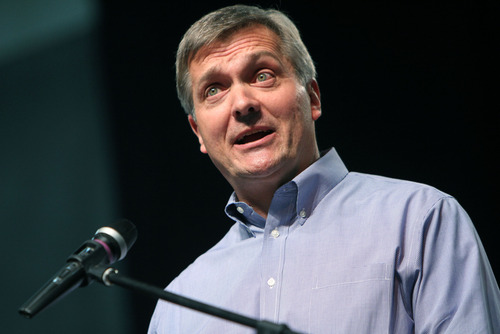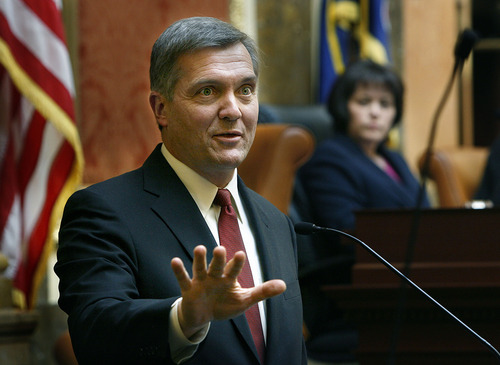This is an archived article that was published on sltrib.com in 2013, and information in the article may be outdated. It is provided only for personal research purposes and may not be reprinted.
Washington • Utah has one Democrat in Congress and last year he voted with the Republicans and against the majority of his own party more than 68 percent of the time.
That's a startlingly high figure, even for a conservative Democrat like Rep. Jim Matheson, and it marks a major shift in how he voted in his previous 11 years in the House.
Just two years ago, Matheson voted with the Republicans 18 percent of the time, according to CQ-Roll Call, which compiles the party unity scores by counting only those votes in which a majority of one party opposed the majority of the other.
Matheson said he couldn't explain the change. He said he perceived no shift in the political climate or type of votes that would describe the drop in his party unity score.
"People on both sides of the equation at times are happy or not happy with how I vote," he said. "But at the end of the day, I just look at each issue on its own merits. That's how I have always been."
Matheson has touted himself as a political independent not beholden to the party strictures that control most of Washington. He is the only member from Utah who didn't support his party more than 90 percent of the time.
Republicans and at least one political scientist suggest Matheson's surge to the right is likely tied to his tough re-election campaign last year, when he ran in a new district against Saratoga Springs Mayor Mia Love, a well-funded black Republican who had the backing of GOP presidential candidate Mitt Romney.
Matheson beat Love in Utah's new 4th Congressional District by just 768 votes.
—
'Political chameleon' • "Matheson's voting shift is nothing more than an attempt to keep his job in Congress as part of a minority party that isn't representative of his district, but funds his campaigns and lets him vote against its agenda when his vote is unnecessary," said Ian Prior, a spokesman with the National Republican Congressional Committee. "Utahns don't want or need a self-interested political chameleon."
The NRCC has spent millions trying to oust Matheson only to come up short and the group has already marked him as a top priority again in 2014.
Matheson denies that his tough election had anything to do with a change in his voting patterns, and while he has reviewed the party unity ratings like those published by CQ-Roll Call, he doesn't consider them when casting his vote.
Keith Poole, a political scientist from the University of Georgia, has created his own widely followed matrix that shows the liberal and conservative shifts in Congress and he says Matheson's numbers tell a story.
"My guess is he started voting more and more with the Republicans to try to hold on to his seat," he said. "I think that probably has more to do with it than anything else."
Poole found that Matheson has become more conservative with each term he has served in the House, while at the same time the Democratic Caucus as a whole has become more liberal, a trend exacerbated by the moderate and conservative Democrats who have lost in recent elections.
The Republicans in Congress, meanwhile, have had even a stronger shift to the right over the past few decades and that continued recently with the rise of the tea party in 2009, he added.
"He is almost at the exact center of the liberal-conservative dimension in Congress," Poole said. "So he is pretty unusual. There aren't too many of those folks left."
One of the reasons Matheson has been able to keep his seat is that he's in touch with the residents in his largely conservative district and tries to keep them in mind when he votes, said Matt Lyon, the executive director of the Utah Democratic Party.
"He is not going to have the pressures to stay in line with the party," said Lyon, who also speculated that a spike in congressional partisanship could explain Matheson's drop in party unity votes.
—
Standing out • No Democrat opposed the majority in his party more than Matheson, and the Democrats who came in second and third in the CQ-Roll Call report (Reps. Dan Boren of Oklahoma and Mike Ross of Arkansas) didn't run for re-election and are no longer in office.
Rep. Collin Peterson, D-Minn., who returned to office in January, had the fourth highest percentage, voting with the Republicans 54 percent of the time.
On the other side of the aisle, Rep. Chris Gibson, R-N.Y., voted most often against his Republican Party, siding with the Democrats 38 percent of the time.
The Washington Post conducts its own party unity survey that includes every vote for each two-year term in Congress. In the term that spanned 2009 and 2010, Matheson backed his party 92 percent of the time. In the session that just ended, that number fell all the way to 53 percent.
The long-term trend shows that Matheson's party unity figure spiked when Democrats controlled the House from 2007 to the end of 2010 and then plummeted when Republicans took over again.
Poole said this could, in part, be explained by the high number of procedural votes where Matheson generally supported his party. Also, in the past two years, Republicans have pushed a number of fiscal measures that attract the support of conservative Democrats like Matheson.
In the past year, Matheson voted with the Republicans and against the majority in his own party to oppose legislation that would raise taxes on the wealthy to avoid the "fiscal cliff," for a proposal to audit the Federal Reserve, for repeal the Affordable Care Act and in favor of holding Attorney General Eric Holder in civil contempt on allegations of withholding documents in a botched gun-running sting operation.
He has voted with the Democrats in opposition to the Republican budget and to extend a payroll tax holiday and emergency unemployment insurance benefits.
Twitter: @mattcanham Utah Senator Mike Lee: The anti-Obama
No sitting senator opposed President Barack Obama's stated position more often that Sen. Mike Lee, R-Utah, according to a CQ-Roll Call report.
The Washington, D.C., publication found that Lee voted against the president 83.1 percent of the time, just short of former Sen. Jim DeMint, R-S.C., who left the Senate to run the conservative Heritage Foundation.
Sen. Orrin Hatch, R-Utah, ranked eighth in opposing the president and that was only 58.5 percent of the time.
Lee, a bit surprised by the disparity, gave an understated response.
"I don't agree with the president on a lot of issues," he said. "I don't look to either the president or my party to decide how to vote."
Matt Canham





